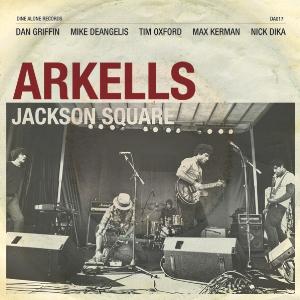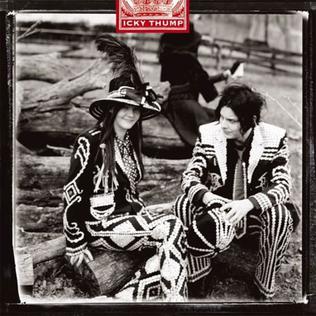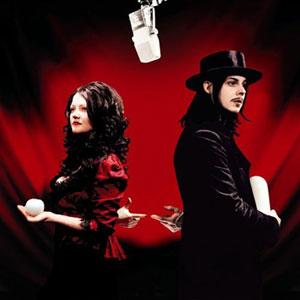 "Juliette" came roaring into my life one early 2010 day. I was at work, trying not to listen to the radio as usual -- we have a 4-hour loop of current hits that enables each of us employees to get very familiar with the every Justin Bieber song's intricacies. Then over the speakers came roaring this gigantic riff, this vintage garage sound worthy of the Kinks, but with a modern sheen and a great chorus. My ears perked up. I knew this was something I needed in my life.
"Juliette" came roaring into my life one early 2010 day. I was at work, trying not to listen to the radio as usual -- we have a 4-hour loop of current hits that enables each of us employees to get very familiar with the every Justin Bieber song's intricacies. Then over the speakers came roaring this gigantic riff, this vintage garage sound worthy of the Kinks, but with a modern sheen and a great chorus. My ears perked up. I knew this was something I needed in my life.It arrived later: Record in a Bag. As the title suggests, it is quite literally a record in a bag. The CD case sits in a plastic ziploc bag full of confetti and other goodies. The confetti is appropriate, since the music contained on the CD is a pure celebration, from their bombastic guitars to their pulsing drums to their weary-yet-charming vocals. The title, prosaic and direct, was fitting for the sound of it: Hollerado are stylish, but not afraid to be honest about what they are, this ragged-sounding, classicist rock band. No tricks or games, but everything they do, they do creatively and excellently.
I was skeptical when I first put the disc in and heard the deliberately jokey "Holleradoland" -- yeah, it has character, but I usually like to get down to business with my opening tracks. So for me, the album begins with the second track, "Do the Doot Da Doot Do," which swings gleefully from its nonsensical refrain, with manic energy and squealing guitars. From then, Hollerado makes some of the most full-bodied rock and roll heard in decades, with more rhythm and heart than I'd heard in years. Vocalist Menno Versteeg wails with wild abandon and enthusiasm, and the band plays in kind, with an earnest sense of humour to boot.
See, that's what I like about this day and age. Some of our best bands, writers and performers have mastered the art of being fun and being funny while also being sincere and deep. Because that depth doesn't always come from the extreme-ness of your expression -- your louder yelling, your supposedly more meaningful lyrics -- it can come from a small moment that seems to symbolize everything. On the road-tripping "On My Own," they sing, "There's a sweater in my dresser drawer that I wear when I'm sick / But the winter's finally over so I won't be bringin' it." It's so weird that this little snapshot couplet can cover so much. Hollerado is ultimately about the little things: they throw in great little guitar moments, nifty background vocals, and interstitial moments like whistling and organs and a capella intros. When was the last time you felt like you could describe an album as "clever?" And not even in a way that implies sarcasm, smugness, or terminal irony.
'Cause yes, it rocks. They make that abundantly clear on the now-viral "Americanarama," which eventually occurred to me as a sort of transatlantic "London Calling," as the band marvels at the country's self-destruction by apparently natural means. "Heyyyyy Philadelphiaaaa / Where'd you go?" is a clarion call for the new decade. Other tracks backing the album up run from the sunny, reflective "Riverside," to the country-blues-inflected "Hard Love," and "Got To Lose," which seems to be an ode both to heartbreak and to natural selection: "We came down from the trees, singing / You've got to lose love if you want to find love!" ("You've got to looooose! You've got to looooose!") I didn't like this lyric until I thought about "find" as a verb and realized it wasn't about having love but that thrill of finding it all over again. And somehow that evolution metaphor seems to work. Then there's "Fake Drugs," which is a good bit of plastic funk, and "Walking On The Sea," which sounds like it might've been at home on a late-90's Big Shiny Tunes compilation. The lonely, jaunty, whistling outro bleeds perfectly to the revelry that comprises the final track.
"What's Everybody Running For?" closes the album urgently, breathlessly, as the band observes the chaos that ensues when the only bar in a small town (they hail from Manotick, Ontario) burns to the ground. The album seems to carry a loose narrative about a road trip through post-apocalyptic North America, but maybe that's all in my head, and maybe it's all tongue in cheek. And it ends with a warm, discrete in-studio applause that feels genuine because whether you noticed or not, something has been accomplished.
Not only did 2010 sound like this album for me, but this album sounds quintessentially 2010 -- present and ready for action, joking, half-serious, fun and uncontrollable. Jose Strummer once said he was partial to albums "made by adolescents" (I'm thinking he meant 20-somethings rather than 12-year-olds) and this is exactly what he was talking about.
This was my favourite album of 2010. I didn't expect it to be -- for a while about half of the album sat unlistened-to while I found better things to do, until curiosity got the better of me, along with the nagging feeling that I was missing something. Then when I was first making this list up it occurred to me how much more I enjoyed listening to this album all year than anything else. It has so much heart and so much spirit, it feels like it's been with me all along.
Look. It's no great critical statement to say Arcade Fire made a great album in 2010, or Gorillaz or Kanye or LCD Soundsystem. But when even Black Keys' down and dirty brand of blooze-rock gets treated like a novelty, I have to wonder, who is standing up for pure good old fashioned rock and roll? Unassuming, unadorned, raw, fun-ass rock? It may not consider itself a great piece of art, but this album was made to be enjoyed and it's plainly irresistible. It doesn't even sound conventional, going way off the rails at any moment with enthusiasm and life. This is what people are thinking when they think of the power of rock. And from a pure enjoyment standpoint, I don't see things getting much better.
At my job, I have the occasional opportunity to offer recommendations. Sometimes people actually ask me for advice, and sometimes their tastes align closely enough with mine that I feel like I can take a stab, and in those cases, I usually reach for this album. I tell them "Look, I'll play you one song and you don't have to buy it, but I'm positive you will walk out of here with this album in your hands." And they always do. This isn't music you keep behind a velvet rope and dust off every once in a while to do some appreciatin'. This is music you keep with you.
Buy this album from iTunes now!
Record in a Bag is the final installment of my 4-part "Favourites of 2010" series. Albums 4-2 were: Broken Social Scene's Forgiveness Rock Record, Locksley's Be In Love, and Zeus' Say Us. The point of this exercise was not to create a pure monolithic ranking of all music from 2010, but to think about what I like and why, both as a means of creating dialogue about music and expressing my tastes, which may help you understand the background of my own reviews. Thanks for indulging me! Here's music:









